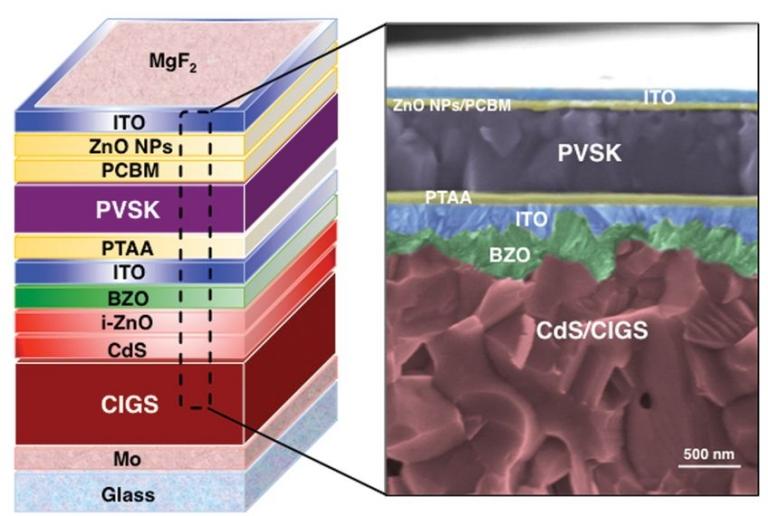TECH

Spray solar cell reaches 22.4% efficiency
Solar cell in series
A solar cell built with the simple spray technique has captured more energy from sunlight than commercial solar panels.The cell is made by spraying a thin layer of perovskite - an inexpensive compound of lead and iodine which proves to be very efficient in capturing energy from sunlight - over a commercially available solar cell known as CIGS - the initials of its component elements (copper, indium, gallium and selenium).The resulting double cell converted 22.4% of the energy received from the Sun into electricity, a record in efficiency for an in-tandem solar cell using these materials. The previous record, established in 2015 by a group at IBM's Thomas Watson Research Center, was 10.9%.The efficiency rate achieved is similar to that of the polycrystalline silicon solar cells that currently dominate the photovoltaic market."With our solar cell design in series, we are drawing energy from two distinct parts of the solar spectrum over the same area of the device, which increases the amount of energy generated by sunlight compared to the CIGS layer alone," said the professor Yang Yang, University of California at Los Angeles.
Towards 30%
The base CIGS cell, which is about 2 micrometers thick, absorbs sunlight and generates energy at a rate of 18.7% efficiency. The addition of the 1-micrometer perovskite layer improves its efficiency as adding a turbocharger to a car engine improves its performance.The two layers are joined by a nanoscale interface that helps raise the cell voltage, which increases the amount of energy it can export. And the whole set sits on a glass substrate about 2 millimeters thick.Yang Yang says that solar cells using the two-layer design can approach 30% efficiency in energy conversion, and his group is working toward that goal.Another advantage is that the spraying technique can be incorporated easily and inexpensively into the processes of manufacturing the existing solar cells.
Bibliography:
High-performance perovskite / Cu (In, Ga) Se2 monolithic tandem solar cellsQifeng Han, Yao-Tsung Hsieh, Lei Meng, Jyh-Lih Wu, Pengyu Sun, En-Ping Yao, Sheng-Yung Chang, Sang-Hoon Bae, Takuya Kato, Veronica Bermudez, Yang Yang

No comments:
Post a Comment